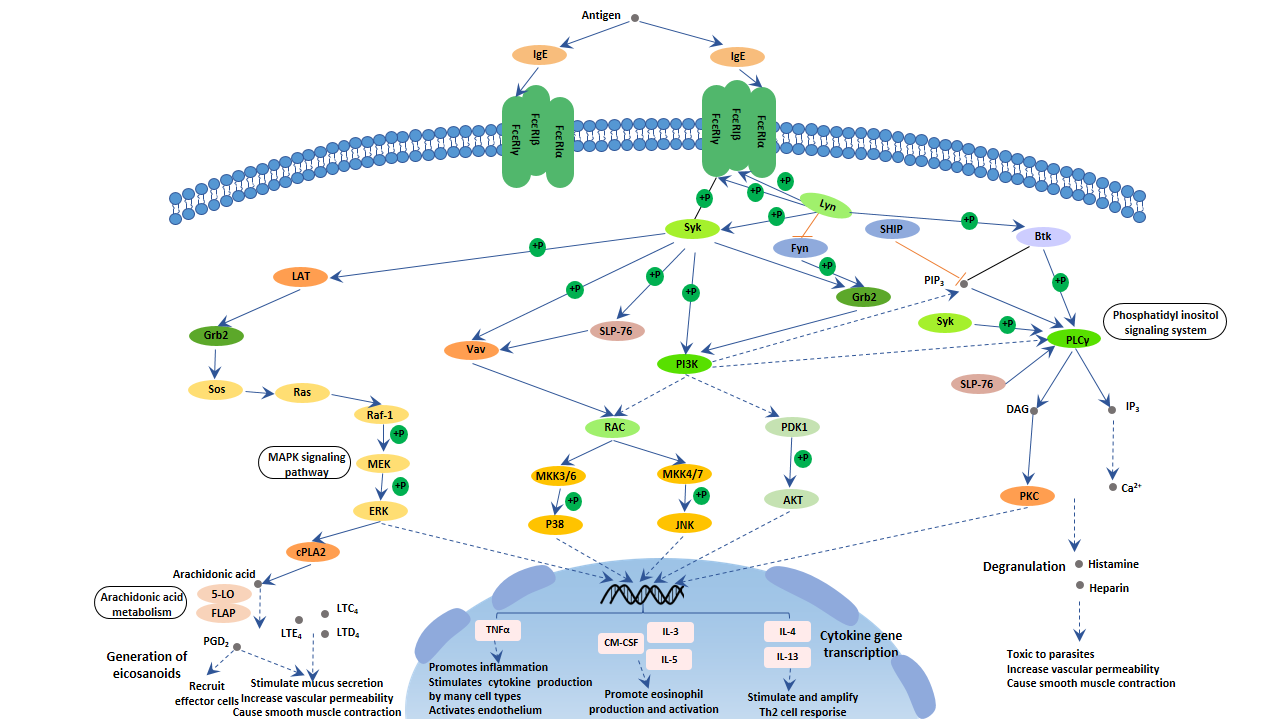
What Is Fc epsilon RI?
Fc epsilon RI (FcεRI) is a high-affinity receptor for the Fc region of IgE. On the mast cells and basophils, Fc epsilon RI is a tetramer with one α-chain, one β-chain, and two γ-chains connected by two disulfide bridges. And it exists as a trimeric complex consisting of one β-chain and two disulfide-bonded γ-chains on dendritic cells, Langerhans cells, macrophages, and eosinophils. The α-chain is responsible for binding with IgE, and the other subunits are helpful for downstream signaling. Because of its cellular distribution, Fc epsilon RI plays a major role in controlling allergic responses. And it also regulates the release of important inflammatory mediators, such as cytokines, interleukins, leukotrienes, and prostaglandins.
What is Fc epsilon RI Signaling Pathway?
The Fc epsilon RI Signaling Pathway in mast cells is an enzymatic reaction process involved in a network of signaling molecules and adaptor proteins. The interactions in these molecules eventually cause a series of parallel effects on degranulation, eicosanoid production, and cytokine & chemokine production and cell migration & adhesion, growth, and survival. Additionally, Fc epsilon RI is central to the induction and maintenance of an allergic response and may confer physiological protection in parasitic infections.
The Process of Fc epsilon RI Signaling Pathway
Fc epsilon RI controls the activation of mast cells & basophils and participates in IgE-mediated antigen presentation. Activated mast cells release preformed granules which contain proteoglycans (especially heparin) and biogenic amines (especially histamines). Fc epsilon RI signaling pathways in mast cells are initiated by the combination of the extracellular domain of the alpha chain of Fc epsilon RI with the Fc region of antigen-specific IgE. Upon Fc epsilon RI aggregation by antigen-induced-crosslinking the immunoglobulin E, beta-subunit-associated LYN is activated and then phosphorylates immuno-receptor tyrosine-based activation motifs (ITAMs) in the beta and gamma subunits of Fc epsilon RI. Phosphorylated ITAMs of the beta- and gamma- subunits recruit additional molecules of LYN and SYK. SYK binding to the Fc epsilon RI complex is activated through conformational changes after tyrosine phosphorylation by LYN. Activated SYK then phosphorylates linker for activation of T L-cells ( LAT ), SH2-domain- containing leukocyte protein of 76 kDa (SLP76 ), VAV, GRB2-associated binding protein 2 (GAB2), and Phospholipase C γ (PLC-γ ), which leads to the activation of MAPK signaling pathway & phosphatidylinositol signaling pathway and the initiating of arachidonic acid metabolism. Moreover, this receptor induces multiple signaling pathways that control the secretion of allergic mediators and induction of cytokine gene transcription, resulting in secretion of molecules such as Interleukins: IL-4, IL-5, IL-6, IL-10, IL-13, INF-gamma, TNF-alpha & GCSF.
The Function of Fc epsilon RI Signaling Pathway
Fc epsilon RI is the Fc receptor on granulocytes, which involves in allergic reactions and protection against parasitic infection. When a suitable allergenic antigen or parasite invades, two IgE molecules crosslink. And then, their Fc receptors on the granulocyte's surface trigger the rapid release of preformed mediators from the granule.
The Applications of Fc epsilon RI Signaling Pathway
When allergens enter into the human body through the respiratory tract, it stimulates the release of IL-4, which subsequently causes the production of IgE. As IgE increases, Fc epsilon RI/IgE signaling pathway is activated. Upon initiating of the signaling pathway, it will make human mast cells and basophils produce important immune mediators that mediates type I hypersensitivity diseases.
Therefore, Fc epsilon RI Signaling Pathway in the human will cause allergic diseases, like Local allergic reactions: allergic rhinitis, allergic gastroenteritis, and urticaria, or fatal systemic allergic reactions: drug allergy such as penicillin. The clinical recommendation is to screen and avoid the allergen.
Scientists have been studying and developing the related drugs to treat hypersensitivity diseases associated with the Fc epsilon RI signaling pathway. The strategy may contribute to develop a novel therapeutic method for the related diseases.





